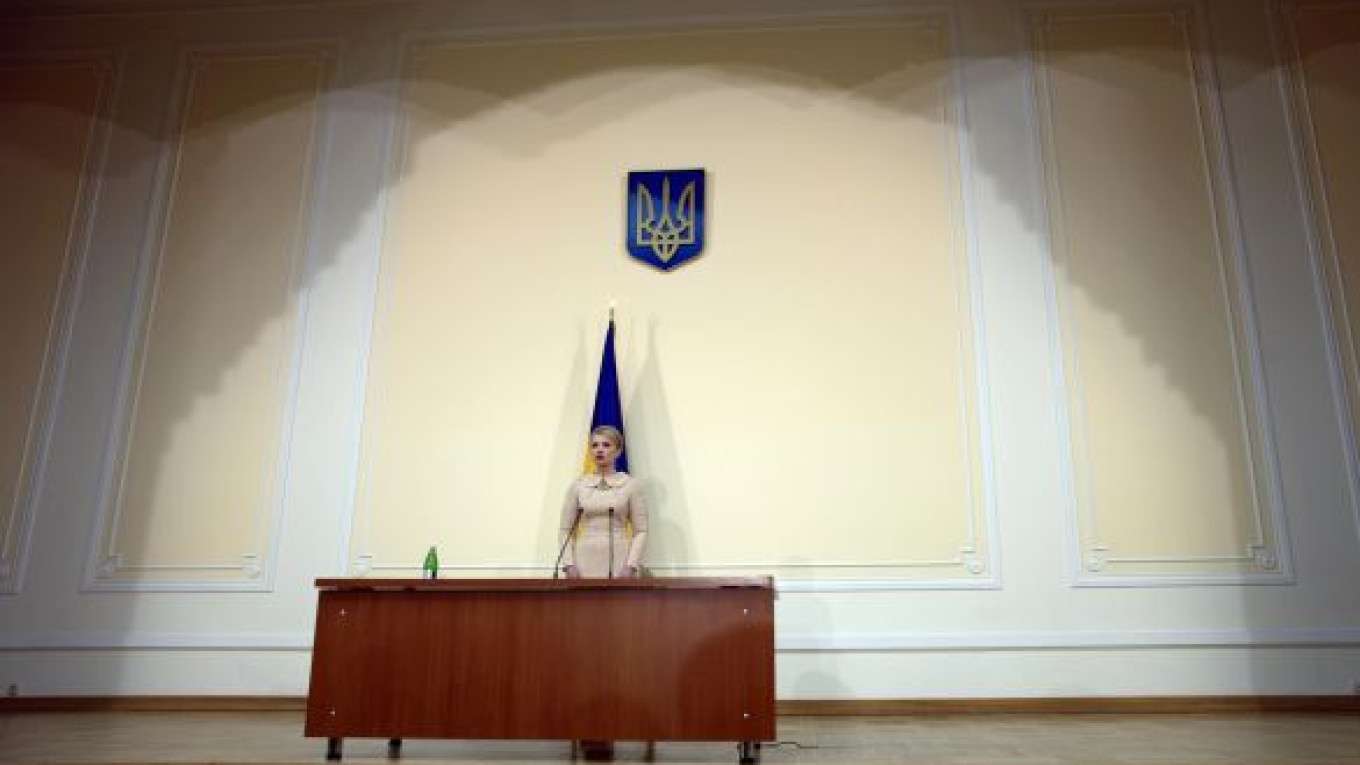Regardless of who wins a second round of voting Sunday to become the next president of Ukraine, an escalation of the country's apparently insurmountable political turmoil now seems inevitable.
Prime Minister Yulia Tymoshenko, who was runner-up in the first round, vowed Thursday to call her supporters to the streets if the voting appears fraudulent. Her rival, former Prime Minister Viktor Yanukovych, called the comments a sign of weakness and alleged that Tymoshenko was already preparing to contest her defeat.
But unlike the last presidential campaign, this conflict is unlikely to last long, political analysts said.
In 2004, the United States, the European Union and Russia were openly taking sides, with the Western-backed Orange Revolution — led by outgoing President Viktor Yushchenko and Tymoshenko — eventually managing to overturn Yanukovych's fraud-tainted win. Following months of massive street protests, Yushchenko was victorious in the second vote.
This time, Washington and Brussels are keeping their distance, frustrated with a disappointing five years that saw little of the uprising's promises for democratic reform and economic vibrancy. That leaves Moscow, which has also scaled back its participation, the best chances to become an external arbiter in the dispute likely to follow Sunday's vote.
Tymoshenko, a charismatic Ukrainian nationalist, collected 25 percent in the first round two weeks ago, promising to continue leading the country out of its major economic recession. Yanukovych, who took more than 35 percent, is banking on heavy support from his traditional base, in Ukraine's Russian-speaking southern and eastern regions, and disenchantment with the Tymoshenko.
Members of Yanukovych's team were quoted by news agencies Thursday as saying that Tymoshenko had already started to mobilize supporters in the country's western regions to rally for her in Kiev and that she was planning to withdraw to avoid losing the vote.
In another sign of the likely wrangling ahead, neither candidate managed to attract support from third- and fourth-place finishers. Outgoing President Viktor Yushchenko, an erstwhile Tymoshenko ally, has also refused to back a candidate after finishing a distant fifth.
Russian officials have been consistently, albeit quietly, indicating in the past few months that they want Yanukovych to become the next president. Last month, Moscow finally sent a new ambassador to Kiev after refusing to deal with Yushchenko's administration.
According to a survey of 1,600 Russians released Thursday by the VTsIOM pollster, 52 percent of respondents said a Yanukovych victory would be more favorable for Russia, while 11 percent said they wanted to see Tymoshenko as the next Ukrainian president.
Forty-two percent of respondents hope that bilateral ties will improve after the elections, which follow five years of alienation and antagonism between the historically close neighbors.
The protests, should Tymoshenko decide to organize them, would be nothing like the scale of the scale of 2004-2005 rallies, which saw tens of thousands of supporters camped in tents on Kiev's Independence Square, political analysts said.
"Many of those who rallied then have become really disappointed in the ideals of the Orange Revolution," said Kirill Frolov, a Ukraine expert with the Institute of the CIS Countries, a Moscow-based think tank.
Also, it would be difficult to mobilize people to defend the government and its leader, because they are responsible for the ailing Ukrainian economy and, to a great extent, the paralysis of the country's political system, said Sergei Mikheyev, a researcher with the Center for Political Technologies.
The United States and the EU, which openly cheered the Yushchenko-Tymoshenko tandem five years ago, are not stepping into the fray this time, which means that Russia may emerge as a sole outsider to whom the warring Ukrainian factions would appeal for support, said Sergei Markov, a pro-Kremlin political analyst and State Duma deputy with the ruling United Russia party.
"The United States and the EU are disillusioned with Tymoshenko and Yushchenko, who failed to build a viable state in Ukraine," he said. "And they don't see Yanukovych as Moscow's hand."
The West's experiments at intervening in politics in former Soviet republics, mainly in Ukraine and Georgia, have subdued greatly after Russia and Georgia fought a brief war in August 2008 and U.S. President George W. Bush left the White House several months later.
"Now, Moscow is in a way better position today to influence politics in Ukraine," Markov said.
The intensity of possible protests after the Sunday vote will depend greatly upon the winner's margin of victory. A narrow win for either candidate would heighten the chances of a standoff, the political pundits agreed.
But the protests will be short-lived if international election monitors say the vote was fair, Mikheyev said.
A Message from The Moscow Times:
Dear readers,
We are facing unprecedented challenges. Russia's Prosecutor General's Office has designated The Moscow Times as an "undesirable" organization, criminalizing our work and putting our staff at risk of prosecution. This follows our earlier unjust labeling as a "foreign agent."
These actions are direct attempts to silence independent journalism in Russia. The authorities claim our work "discredits the decisions of the Russian leadership." We see things differently: we strive to provide accurate, unbiased reporting on Russia.
We, the journalists of The Moscow Times, refuse to be silenced. But to continue our work, we need your help.
Your support, no matter how small, makes a world of difference. If you can, please support us monthly starting from just $2. It's quick to set up, and every contribution makes a significant impact.
By supporting The Moscow Times, you're defending open, independent journalism in the face of repression. Thank you for standing with us.
Remind me later.


